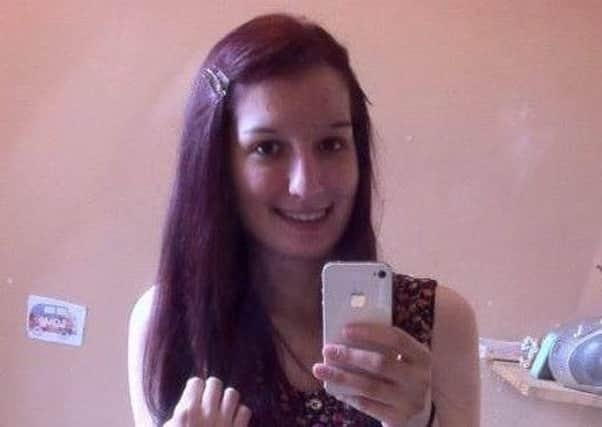Harbour patient, 20, died after doctors '˜reduced observation levels'


Despite several previous attempts to take her own life, doctors at The Harbour in Preston New Road decided 20-year-old Sally Hickling no longer needed staff to constantly watch her — instead carrying out 10-minute observations.
Shortly after 1pm on the same day, nurses discovered her face down on the floor with a ligature around her neck, the court was told.
Advertisement
Hide AdAdvertisement
Hide AdShe later died at Blackpool Victoria Hospital after suffering irreversible brain damage.


Dr Thirunavakkarsu Aravinth told the hearing, held at Blackpool Town Hall, he thought reducing observations from level three to level two was in Sally’s best interests.
But coroner Alan Wilson questioned the decision, which came four days after the she was admitted to hospital after a similar suicide attempt.
He said: “You reduced observations to every 10 minutes but on July 9 she was taken to hospital because she was found with ligatures around her neck.
Advertisement
Hide AdAdvertisement
Hide Ad“Doesn’t that suggest sufficient risk that she should have stayed at level three for a longer period of time?”


Dr Aravinth said the decision was made by a team of doctors and backed by Miss Hickling, and said he wanted to build trust with her to help her recover.
“I needed to work with her together; it’s a balance made looking at the best interests of the patient,” he said.
“You can leave patients on high levels of observation but you would be doing a disservice to them.
Advertisement
Hide AdAdvertisement
Hide Ad“We needed to try something. She wanted to come off the level three.
“There was respect and a mutual understanding between us. Every time that request came from her it was genuine.”
The court, which is expected to sit until Wednesday, was also told Harbour consultant Dr Chandrashekar Gangaraju signed off Miss Hickling’s paperwork without seeing her himself, ‘deviating from his legal duty’, because two other doctors were not yet clinically approved and therefore could not complete certain tasks.
Mr Wilson asked him: “You acknowledge you had not seen or had any dealings with Sally Hickling?”, and “When you were approached and were asked about the consent to treatment form, you were aware it was your duty to have spoken to Sally?”
Advertisement
Hide AdAdvertisement
Hide AdDr Gangaraju answered ‘yes’ to both questions but said he trusted the doctors’ judgments.
Miss Hickling, who spent more than three years at The Platform in Preston after being diagnosed with anorexia and traits of a personality disorder as a teen, asked to go into The Harbour for 72 hours after her grandfather died last March. She was kept in on March 31 after concerning doctors with her behaviour, with mum Katy telling the inquest her daughter would suffer panic attacks, mood swings, and was taking up to 26 laxative tablets a night in order to stay thin.
She weighed seven stone when she died and was classed as severely underweight on the body mass index (BMI) scale, the hearing heard.
“She would be very up or very down, there was no in-between,” Mrs Hickling said.
Advertisement
Hide AdAdvertisement
Hide Ad“She was either on top of the world, wanting to volunteer or get a job, and then she would in bed, lethargic and not doing anything.”
The jury, used because Miss Hickling was a ‘detained patient’ at the time of her death, was sworn in at around 10.30am on Thursday.
They were told she had self-harmed and attempted to on several occasions during her time in hospital, and was at one point kept at arm’s length by worried staff.
Her observation level was later lowered to level three, which meant she was kept in the view of nurses, and then to level two — switching between the two as and when her condition changed, as is standard practice, the court was told.
Advertisement
Hide AdAdvertisement
Hide AdWeeks after being admitted, on April 11, Miss Hickling was transferred to a mental health unit in Burnley against her and her family’s wishes, but returned two days later.
Ward matron Helen Wolfe said in a written statement the transfer was necessary to accommodate a patient with greater clinical needs but was only ever intended to be short-term.
The hearing was also told that doctors, Miss Hickling, and her family couldn’t agree on her care.
She and her family wanted her to go into a specialist unit, while community consultant psychiatrist Dr Haroon Moosa wanted her to be ultimately discharged and cared for in the community.
Advertisement
Hide AdAdvertisement
Hide Ad“The reason to discharge into the community was to give her psychiatric therapy,” he said.
Dr Moosa denied there were imminent plans to discharge Miss Hickling, as she and her family feared, and which Mrs Hickling said contributed to her escalating behaviour.
The court heard that she was anxious about an upcoming meeting to discuss her future, on the afternoon of July 13, and was also upset about her grandmother’s recent death, and an accident suffered by her brother.
Ward nurse Steve Fagan said Miss Hickling had spent the morning in a communal area, where he could see her from his office.
Advertisement
Hide AdAdvertisement
Hide AdHe told the hearing he was called to help with another patient, and that Miss Hickling had gone to her room by the time he got back.
Shortly after noon, agency healthcare assistant Falitate Ego Olademeji checked on her, and said: “She was sitting on her bed; she was drawing and playing music.
“She was just relaxing. I said she was drawing very well and it was lovely. She was in a happy mood.”
The court was shown CCTV footage of the corridor outside her room on the Byron Ward – a female intensive care unit which shut temporarily months later due to a staff shortage – taken shortly after 1pm.
Advertisement
Hide AdAdvertisement
Hide AdThe jury watched on as they saw Ms Olademeji, peer through Miss Hickling’s door, later said to be at 1.06pm, before checking on her again a little later.
There was no time stamp on the video, but Mr Wilson said more than 10 minutes had elapsed.
Giving evidence, Ms Olademeji said she was working only her second shift at the hospital and blamed the slight delay on her trying to speak with a ward manager.
After being unable to do so, Ms Olademeji said she returned to her room, where she found her lying on the floor and raised the alarm.
Advertisement
Hide AdAdvertisement
Hide AdNorth West Ambulance Service (NWAS) paramedic Graham Fletcher said he was called to the facility at 1.20pm.
He said ward staff had given CPR and applied a defibrillator, and described Miss Hickling as being in a ‘post-cardiac arrest condition’.
She was taken to the hospital, where medics had been placed on standby for her arrival.
But after tests showed signs of brain damage, and with her condition deteriorating, she was placed on an end-of-life plan and died shortly before midnight on July 30, the court heard.
Advertisement
Hide AdAdvertisement
Hide AdPathologist Dr Dariusz Golka, who conducted a post mortem examination said she had suffered serious brain damage.
Pneumonia she developed in hospital, and her low weight, are believed to have been contributory factors, he said.
Following her death, The Sally Hickling Trust was launched to support the ‘mental well-being of young women of all ages in the UK and Ireland’, through music and arts.
More than £3,500 has been raised through an online donation site.
The inquest resumed this morning. See tomorrow’s Gazette for a report on proceedings.